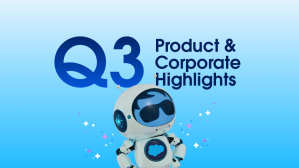Most people don’t think about it as they sprint through a supermarket for diapers or shop for a new washing machine, but the consumer goods and manufacturing industries are in the midst of a revolution.
Rapid technological changes, which in turn have enabled both the emergence of new ‘direct to consumer’ business models and changing customer preferences, have altered what it means to operate successfully in both industries.
It’s no longer enough for manufacturers to simply make a product. Internet of things (IoT) technology that collects and transmits data means they’re empowered — and increasingly, expected — to proactively maintain that product across its lifecycle.
Jet engine makers now get data on those engines before, during and after every flight — and can use that data to optimize performance and spot and preemptively solve issues. Manufacturers are now offering services to customers, not just products. In reality, jet engine manufacturers are in the business of selling engine uptime today, not the engines themselves.
In the consumer goods sector, competition has ballooned as it has become easier for smaller players to break into the market as the internet has lowered barriers to entry. New technology makes it easier for brands to get new products on the shelves faster. Nimble, digital-first competitors — those you see in Facebook and Snapchat ads for cheap razors, new sneakers and trendy hoodies — are bypassing middlemen altogether and selling directly to consumers through the internet, often on a subscription basis.
Similarities in Manufacturing and Consumer Goods
Both industries, therefore, are facing up to similar transformational trends. Fourth Industrial Revolution technologies — such as AI, blockchain, IoT, 3D printing — are unleashing disruptive forces in both industries, and upending traditional business models.
Both industries face demands for an increasingly customer-centric mindset, where companies understand their customers more deeply than ever, and use that understanding to build more personal, relevant and targeted products and services.
And many of the long established companies in those industries face a challenge from players that have a relentless focus on consumer convenience and leveraging new supply chain models to take advantage of those disruptive technologies.
In the future, responsiveness and agility — whether on direct or indirect channels — will be the mantra in manufacturing and consumer goods. As such, both industries must work more closely, transparently, and effectively with their channel and retail partners respectively.
Cross-Industry Trends and Bespoke Solutions
As Executive Vice President and General Manager of Industries, my role is to have a view across all industries we operate in and identify the unique needs of individual industries as well as those processes and best practices that can be shared across industries to enrich each cloud.
At first glance, a sales representative for a breakfast cereal company and an auto insurance agent might not seem to have that much in common. But we understand that they both need to assess a situation — whether that’s product placement in a supermarket or damage to an automobile — while in the field, analyze the data and then connect with their teams on the next steps.
Suddenly, we can see these industries need solutions with similar elements, and that we have components and services that can be shared among different industries, allowing us to build more quickly, but always delivering configurations that take care of the unique needs of that industry.
This is our approach for every industry — evaluate the operational structures, functional footprints and business challenges to discover the unique needs of each industry and also find commonalities. This allows us to build reusable components — all built on the Salesforce platform — that can be fine tuned for each industry, so we can help businesses to more accurately forecast demand, optimize their planning, and create competitive advantage. And it all starts with listening to our customers and developing in-depth partnerships with them so they have direct input into the products we’re building.
In the consumer goods industry, we’ve worked with a large food and beverage retailer, who wanted to get more visibility into how their products were selling across their customer base. As part of our Consumer Goods Cloud we are developing technology that can help analyze what products are selling well, and provide insights into what’s popular among similar retailers.
In this way, Consumer Goods Cloud will put the power of data in the hands of customers and field sales representatives, streamlining operations, and elevating in-store experiences for the end consumer.
We use our Einstein AI technology to make the lives of those field sales representatives better. Rather than having to manually check the number of products on a shelf, reps can use Einstein Vision to take a photo of the shelf, and automatically identify the specific products on it. And because those reps aren’t spending so much time on auditing, they have more time for building relationships with retailers and driving sales.
The manufacturing industry also relies on understanding sales patterns and driving predictability.
Manufacturing businesses often have complex physical operations that can’t be easily modified to meet changing customer needs, which means scaling up to fulfill new orders can be both expensive and time consuming without the visibility that allows them to predict demand. Poor planning has a flow-on effect for sales and account management teams, who are on the frontline of managing customer expectations. With intelligent forecasting, Manufacturing Cloud enables accurate future sales predictions, breaking down the silos between front and back office and empowering Sales, Manufacturing and Operations to align.
Both the manufacturing and consumer goods industries are facing a set of common challenges, based on the changes inherent in the Fourth Industrial Revolution.
Those challenges mean they need to change almost everything they do. Change how they sell. Change how they compensate their people. Change how they view their billing systems. And ultimately, shift from a product-centric, to a customer-centric business, putting the customer and/or consumer at the center of everything.
There is a fundamental transformation going on in the way both industries are engaging with their customers, and I’m excited that Salesforce is empowering them and powering that transformation.






















